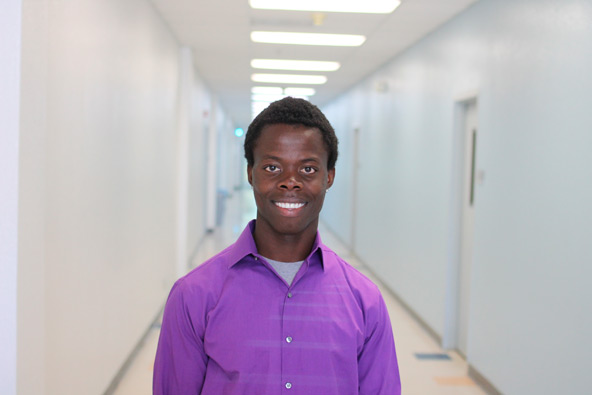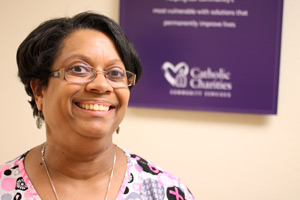
GLENDALE — As a child, Johnson Toe spent 12 hours a day farming okra, rice, tomatoes and peppers on his grandmother’s farm in Liberia.
The Glendale Community College sophomore arrived here as a refugee eight years ago, when he was 12. He’s still figuring things out with the help of Catholic Charities unaccompanied minors program.
“There are so many options,” Toe said, noting that when he arrived he didn’t speak the language. It was hard to get through sixth grade, Toe said.
What made things even more difficult is that Toe arrived alone. Back in Liberia, he barely saw his father and never met his mother. His grandmother raised him and he helped her on the farm and with hunting.
“When you grow up, you do whatever your family does — you do anything you can to help your family,” he said.
Violence in Liberia forced Toe and his cousin into a refugee camp in Ivory Coast when he was 9. Life in the camp was like a little community inside a fence.
Humanitarian workers would bring food, clothing and other items to help refugees get by. There wasn’t any work or school. Yet Toe said it was a drastic improvement from the violence he was fleeing.
Before coming to the United States three years later, a car hit and killed his cousin outside the camp. Once in the Arizona, Catholic Charities got Toe into school and into a foster care home.
Nearly 14,000 children are in need of a home in Arizona — that number includes unaccompanied minors. Catholic Charities’ foster care program helps match children with families, and puts an emphasis on keeping siblings together.
Catholic Charities facilitates adoption for children currently in foster care, with licensing and training and helps set up special homes for children with medical needs and homes for unaccompanied minors.
Karen Resseguie, senior program manager of unaccompanied minors, said parents “are really the heart of our program.”
“They really are the ones that help [unaccompanied minors] adjust, learn English and acclimate to the culture,” she said. “Foster parents are the ones helping them with school, too.”


Pat Bell is one of those parents. She got involved with foster care after hearing about “the Lost Boys” of Sudan at her place of worship, St. Mary’s Episcopal.
“I had to do something,” Bell said, noting she’d watched a documentary on the second Sudanese civil war, which took 2.5 million lives from 1983-2005. “This was outrageous.”
Through Catholic Charities, Bell took in some of “the Lost Boys,” the 20,000 displaced and orphaned by the Sudanese conflict.
“It’s the best thing that I’ve ever done,” Bell said of being a foster mother. “You haven’t lived until you’ve given back unconditionally.”
Bell, a school nurse, said she grew up with everything she needed “and many things I wanted.” The children she takes in don’t have the things they need.
“All they wanted was to be safe, to have a pencil and a piece of paper,” she said. “They didn’t want designer clothes — and they thought everything I cooked was delicious! Even my meatloaf!”
Bell describes her house as a mini United Nations and said she’s received more than she’s given as a foster mother. She gives her children much needed structure and love — even through difficult times.
She lays down the rules and makes the kids stick to it. That’s not always easy with unaccompanied minors, who’ve grown accustomed to looking after themselves. Some come from countries “where they don’t have a female telling them what to do,” Bell said.
When she encountered this with some of the Sudanese children, Catholic Charities sent over a native to explain how things work in the United States. Bell couldn’t believe how quickly the agency took care of it.
“The dedication of the staff here is second to none,” she said. “I have no idea how everyone on this staff has it together. I don’t know how they do it.”
Strong support is crucial in the unaccompanied minors program. Cultures collide and often children are coming from war-torn countries.
Things aren’t easy. They certainly weren’t for Toe when he arrived from the Ivory Coast refugee camp. On top of the change in culture, classmates made fun of him for not speaking English and for being black.
Catholic Charities takes care of his medical insurance and other expenses so he can make it on his own when he turns 21. He attends a monthly meeting about saving money, protecting against fraud and other life skills.
Toe played three varsity sports while in high school and likes to help others with physical fitness. He works at the YMCA.
“You don’t have to keep the birds away from the rice,” Toe said of supermarkets. “I didn’t have a family member to help me when I didn’t have money to pay for things. But I had Catholic Charities.”
Catholic Charities Foster Care
To learn more about Catholic Charities foster care program call (602) 943-3843 ext. 51910 of visit their website:





